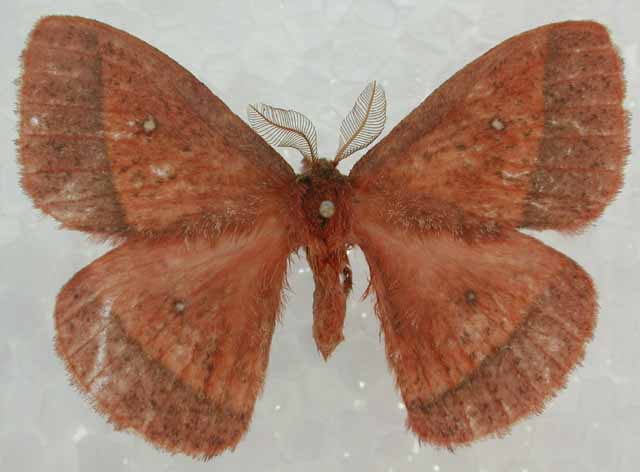Decachorda pomona
|
|
Updated as per T. Bouyer's Catalogue, 1999, April 4, 2006
Updated as per E. Pinhey's Emperor Moths os South and South-central Africa, April 4, 2006
|
Decachorda pomona
dek-uh-KORD-uhMpeh-MOH-neh
(Weymer, 1892)
(Dreata) RO

Decachorda pomona (male), Tanzania, courtesy of
Eric van Schayck.
| TAXONOMY:
Superfamily: Bombycoidea Latreille, 1802
Family: Saturniidae Boisduval, [1837] 1834
Subfamily: Saturniinae Boisduval, [1837] 1834
Tribe: Micragonini Cockerell in Packard, 1914 (1902)
Genus: Decachorda, Aurivillius,1898 | |
MIDI MUSIC
"Moon River"
copyright C. Odenkirk
ON.OFF
<bgsound src="moon.mid" LOOP=FOREVER>
|
DISTRIBUTION:
The Large Rosy Roundwing,
Decachorda pomona (forewing length: 22-18mm), flies in
Kenya,
Tanzania,
Zambia and
Zimbabwe.
I have very little information
about many of the African species. Distribution/range, flight times,
images, etc., would be greatly appreciated.
Send info and/or pictures to
oehlkew@islandtelecom.com. Every little bit helps!
Pinhey describes D. pomona as having a uniform dark red ground colour
with a straight outer line. He indicates he is not confident of that
description. If he is correct, the moth depicted above is more
likely (based on darker postmedian/submarginal area) D. aspersa.
FLIGHT TIMES AND PREFERRED FOOD PLANTS:
This moth
probably flies in December-January, again in April, and possibly
at other times.
Decachorda pomona
larvae probably feed on Hyparrhenia.
ECLOSION, SCENTING AND MATING:
EGGS, LARVAE, COCOONS AND PUPAE:
Larval Food Plants
It is hoped
that this
alphabetical listing followed by the common name of the foodplant will
prove useful. The list is not exhaustive. Experimenting with closely
related foodplants is worthwhile.
Hyparrhenia......
|
Thatching grass
|
Use your browser "Back" button to return to the previous page.
Return to Decachorda Genus
Go to Index for African Saturniidae
Go to Main Index for all Worldwide Saturniidae
The pronunciation of scientific names is
troublesome for many. The "suggestion" at the top of the page is
merely a suggestion.
There are many collectors from different countries whose
intonations and accents would be different.
The genus name Decachorda means ten chords
and may refer to the number of veins on the forewing.
The species name "pomona" is for Pomona, the goddess of the apple
tree and other fruit trees.
